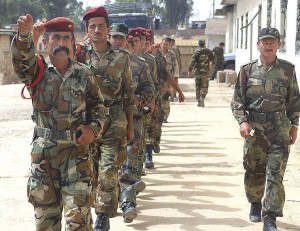On July 27, thousands of Iraqi troops, tanks, and artillery set out to seize the FishKhabur border crossing with Syria in Iraq’s northern Zumar district. But the days when Iraq could impose its will over the scrappy and restive Kurdish north are over. Blocking them were some 3,000 Kurdish Peshmerga fighters, along with artillery – intent on proving that Baghdad’s supremacy is no more. A tense standoff between the Iraqi army and Kurdish Peshmerga ensued, only to alleviate with American pressure and a fragile agreement between the two sides. The standoff reflected the situation at large: Iraqi Kurdistan is determined to rid itself of Baghdad, establish itself as a regional player, and use its burgeoning clout to serve as the protector of Kurds throughout the region. Most importantly, attempts by rival states to thwart Kurdish ambitions threaten to ignite a new round of Kurdish wars in a region already in flames.

This border area is disputed by the Shiite-led Iraqi government and the Kurdistan Regional Government (KRG). FishKhabur has been under Kurdish military control for years, which Iraq claims is illegal and violates the country’s constitution. The KRG disputes this and is determined not to forfeit their only border crossing with Syria, nor to allow Baghdad to reestablish its influence in an area already “Arabized” and largely depopulated of ethnic Kurds. Despite Baghdad’s official protestations, the reality is much more strategic.
Iraq’s move on FishKhabur is a serious development, as it seeks to control the border crossing so as not to allow unchecked Kurdish continuity between northern Iraq and Syria. Also, it should not be ruled out that the incursion was a show of strength by Iraqi PM Maliki, now emboldened from surviving a no-confidence vote, and determined on teaching the KRG a lesson for seeking to oust him earlier this summer. But Iraqi Kurdistan is a rising player in the Middle East. A de facto-state, the KRG has hundreds of thousands of seasoned troops, great economic potential, and a strong desire to pragmatically increase its independence. Few players in the region, aside from Israel, are keen on seeing a Kurdish ascendancy, one whose gains are seen as contradictory to the respective national interests of many states.
Nowhere is this more evident than in Syria.
The standoff in Iraq is connected to Syrian-Kurdish developments. In recent weeks, the Syrian Army withdrew from the Kurdish-majority northeast, likely in coordination between Syrian-Kurdish parties and Damascus, and left the door wide open for Kurdish rule. Almost immediately, the Kurds seized control over cities and towns in the area. Unlike the Arab Sunni uprising, the Kurds did not fire one shot to free their cities. Dominating the region now is the Democratic Union Party (PYD), the most powerful Syrian-Kurdish party, a periodic ally of Assad, and linked to the militant Kurdistan Workers’ Party or PKK. Needless to say, while Iraq and Turkey do not agree on much these days, they are both opposed to Kurdish control of northeastern Syria.
Turkey’s quest to oust Assad and play a leading role in a post-bellum Syria is not without consequence. Such efforts have brought Turkey’s enemy, the PKK, to yet another Turkish border. For Turkey, a country engulfed in decades of bloody warfare with the PKK in southeastern Turkey and northern Iraq, a new front for PKK militants is an unwelcome development. Baghdad on the other hand is wary of increased Kurdish autonomy, unity, oil contracts, and military strength; all of which threaten efforts to maintain a unified, powerful, and stable Iraq.
Given stability in the KRG, far superior when compared to most of Iraq, Iraqi Kurdish President Barzani is working to facilitate his ethnic-kin’s gains in Syria. As Iraq’s Kurdish de-facto state continues to ascend, other Kurdish sectors are energized and will likely seek to follow suit, thereby making the KRG even more influential as it remains the region’s only Kurdish entity. Moreover, an increasingly strengthened and robust KRG is likely to prevent the use of the Kurdish-cause as a game of chess between competing regional powers, a notable past-time for Iran, Syria, Turkey, and Iraq. In the long-term, reducing interference from regional powers will likely erode the main hindrance to Kurdish aspirations, their lack of unity. With all Kurdish parties unified against Iraq’s incursion, it seems Baghdad’s actions are only enhancing that long-awaited unity.
The current tension is a classic Middle East tussle, wound up by transnational disputes, aspirations for power, and revenge. Clearly, regional states are scrambling to deal with the unforeseen Kurdish ascent, perceived as threatening their interests of machtpolitik. In the end, geopolitical realities are different in 2012 than in previous decades, which is evident in the KRG’s development into an increasingly influential Middle East player. Unfortunately for their rivals, they have little ability to stop it.
This article was written by Daniel Brode and was also published on Middle East Online.